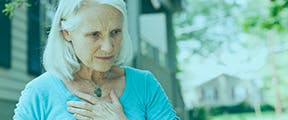
COPD signs and symptoms
It’s important to know the signs and symptoms of COPD and how you can avoid symptom triggers. If you think you may have COPD or if you have COPD and your symptoms flare up or worsen, be sure to talk with your doctor.

Common COPD symptoms: what to look for
At first, you may think you just have a nagging cough. Or maybe you think you're “just getting older,” so it's “normal” to feel a little tired and out of breath. But if these symptoms don't go away, they may be signs of COPD. Over time, these symptoms can worsen, seriously affecting your ability to breathe and go about your daily activities.
Common COPD symptoms include:
- Shortness of breath: You feel like you're running out of air even if you breathe harder, and you may find it difficult to breathe during physical activity or even while you are resting.
- Chronic coughing
- Wheezing
- Coughing up mucus
- Chest tightness
- Frequent colds or respiratory infections
As COPD progresses and becomes more severe, you may experience:
- The common symptoms listed above, despite the use of daily maintenance medications
- COPD exacerbations or flare-ups
- Fatigue
- Weight loss
It's always important to stay aware of your symptoms and keep your doctor informed. If your symptoms worsen or you experience a sudden COPD exacerbation, you should see your doctor as soon as possible.

Avoiding COPD symptom triggers
Triggers are things or situations that can make your COPD symptoms worse and possibly lead to a COPD exacerbation.
Common symptom triggers include:
Smoking or being around others who smoke.
Quitting smoking and avoiding being around others who smoke can help you manage COPD symptoms.
Household dust.
Keep your home free from excess dust and other irritants.
Fumes from household cooking or cleaning products.
Use a cooking vent to draw away irritating fumes.
Indoor and outdoor air pollution.
Avoid using aerosol sprays and household cleaners. Stay indoors when outdoor pollution levels are high.
Having the flu or pneumonia.
Ask your doctor about getting vaccinated. It may help you avoid an infection that could make your COPD worse.
Catching a cold.
Avoid crowds in enclosed spaces, especially in the Winter and Spring when most people get colds.
Spreading germs.
Wash hands the right way. Wet hands, lather with soap, rub palms vigorously for 20 seconds, rinse well, and dry with a clean towel.
Cold air or being in a cold environment.
Cold air can trigger shortness of breath. During winter, try to limit your time outside. During summer, avoid very cold settings on your AC.
Get your COPD Treatment Guide.
Answer a few questions to learn about COPD treatments that may help you or the one you care for.

